There is a moment in Baz Luhrmann’s splashy, garish adaptation of F. Scott Fitzgerald’s American masterpiece, The Great Gatsby in which Nick (Toby Maguire) encounters the elusive, enigmatic Jay Gatsby (Leonard o DiCaprio), gazing at the green light on the pier of Daisy, his lost love. Gatsby has invited Nick to one of his lavish parties (the only person to receive an invite) in the hopes of encouraging Nick to invite Daisy over for tea. His plan is to casually stop by and finally reunite with her. Gatsby appears anxious and desperate to show Nick his appreciation for Nick’s aide, desperate to make it up to him but Nick brushes off his gratitude, simply saying, “Jay, it’s a gift,” and Gatsby responds with a nervous, grateful smile. It’s an undeniably effective moment. DiCaprio’s Gatsby appears as a man whose gestures are at once meticulously planned, yet uncertain and self-conscious. In that moment, both Nick and the viewer understand Gatsby’s inner workings. For all his lavish parties and excessive wealth, he exists as a man who can be floored by the potential reunion with a lost love and remains slightly uncertain how best to interact with the world in a non-social setting.
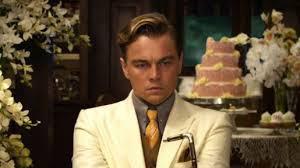
“No, I don’t want any cake! This all for her, not me.”
I’m going to try to review this film without comparing it to the novel upon which it is based, because a step-by-step comparison serves neither the film nor its brilliant source material. I don’t demand a film be a pure representation of the material that inspired it. As long as the movie works as a well-made, entertaining product, I’m willing to give it credit. After all, movies have no real obligation to be pure recreations of their source materials, and complete faithfulness to a source material, and the era in which it is set, is hardly Baz Luhrmann’s style. If Gatsby feels there is no reason the present need be like the past, Luhrmann feels there exists no reason that both the present and the past shouldn’t co-mingle in an uneasy, jarring marriage of no one’s convenience. So what if Jay-Z and Gershwin aren’t contemporaries? Why should that stop both of them from appearing on the same movie soundtrack? No reason Luhrmann can think of!
What most struck me while watching Luhrmann’s frothy, melodramatic adaptation was how much of this film resembles Luhrmann’s 2001 musical extravaganza, Moulin Rouge. Both feature young, naïve protagonists (who first appear on film deeply haunted by the events they are about to relate to the viewer), both with notions of being a writer, entering alluring worlds of excess and depravity, and witnessing a love affair fall apart at their feet. Granted Moulin Rouge’s protagonist is more actively involved in the action and Toby Maguire’s Nick really just observes from the sidelines, but thematically they cover similar ground. If they are thematically similar, Luhrmann decided a similar visual approach, with spinning camera shots, vibrant color palette, and large, played to the back of the theatre, performances would serve both films equally. Subtlety and Baz Luhrmann may have once been briefly introduced, but Lurhmann found her a cold and brutal presence. He retreated into the arms of her best friend, Beat-You-Over-the-Head-with-Imagery (it’s a family name), a far warmer, more welcoming companion. They’ve been together ever since.
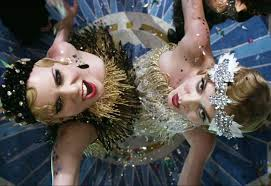
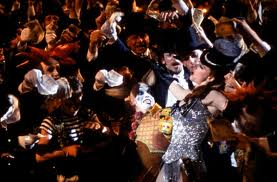
Guess which film is which, and win a prize! (Note: We will not be giving any prizes. Sorry)
For those who don’t know (and if The Great Gatsby’s plot is unfamiliar to you, I wouldn’t tell anyone about it), the plot centers around Nick Carraway (Maguire, likable, if a touch bland and a shade too old to play the 30-year old naïf), the narrator living in the less respectable, nouveau riche, New York, West Egg. He finds himself living next to the lavish mansion of the enigmatic Jay Gatsby (DiCaprio), thrower of extravagant parties and eternal reacher towards the green light at the end of an across-the-way pier. That pier belongs to Daisy Buchanan (Carey Mulligan, delicate and lovely, with eyes that seem eternally filled to the brim with with tears), Nick’s cousin, and her husband, Tom (Joel Edgerton, effectively brutish and overloaded with testosterone).

Note the subtle symbolism here concerning Daisy’s fragility and delicacy. It’s so subtle, I bet you didn’t even notice.
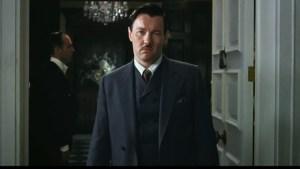
I tried to find a picture of him from the film that didn’t make him look like an asshole. After an hour of searching, I decided that was a silly thing to do and abandoned the quest.
Tom, meanwhile, indulges in an affair with Myrtle (Isla Fisher, all extremes in an underwritten role), the garish wife of a poor mechanic (Jason Clarke, never rising above the “cuckold husband” label the film provides), and Daisy, with Nick’s help, finds herself reunited with Gatsby.

Can you tell that Tom’s kinda slumming it here?
They’d been lovers once, and Gatsby has spent every second of his life since their encounter making himself over into an image he feels would be worthy of her love. Every action he undertakes, from his large mansion and lavish party to his vivid array of dress shirts, has been adapted for her. Armed with that revelation, Daisy indulges in an affair with Gatsby that spans the summer months, until revelations and tragic accidents sever ties and send the characters hurling towards the film’s climax. Nick enjoys a brief flirtation with the lovely, jaded, Jordan Baker (played with a “seen-it-all” verve by Elizabeth Debicki), but he’s ultimately too enraptured with Gatsby to pay her too much attention.
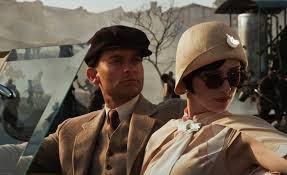
“Huh. Well, look at that. Hmm? Oh, you already were.”
I’ll be honest. I like Baz Luhrmann’s directorial style, despite its propensity to drift into overkill. I love his anachronistic soundtrack selections, his lavish, excessive visuals, and the unabashed romance and sentiment constantly on screen, . As a result, I found the film’s visuals are beautiful, strange and arresting. However, his Great Gatsby spends much of its beginning (about 40 minutes of a two and a half hour running time) feeling awkward and staged to the point of emotional detachment. The supporting performances are, at times, so large, you feel a need to lean away from the screen, in the hopes the characters will simply take a hint and vacate your personal space. There are also moments in which his visual touches, with typed words and letters flashing across the screen and party scenes that feel more than a touch indulgent, are more exhausting and headache-inducing than dazzling. I spent much of the film’s set-up feeling like I just wanted to stop watching, and cover my eyes and ears to protect them from an attack that would clearly damage both retinas and eardrums. My senses were being assaulted, and my eyes and ears needed a respite from the over-stimulation they were enduring.
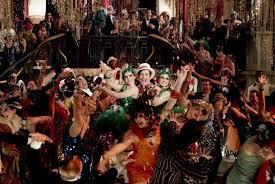
Well, that’s a bit much. I’m sure they’ll give me a break soon.
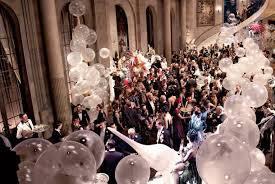
Please, I beg of you. Some mercy, please. Sanctuary!
Then, a miraculous miracle occurred. Leonardo DiCaprio’s Gatsby steps into the frame and the film finds its footing. Leonardo DiCaprio, with a face that seems both youthful and haunted beyond its years and eyes that seem capable of expressing every emotional drive at once, beats Luhrmann’s excesses into submission and forces the film to follow his lead. His Gatsby is at once hopelessly vulnerable, unyieldingly hopeful, and constantly poised, and he has the viewer’s sympathy from the near outset. Gatsby has a carefully rehearsed, excessively practiced appearance and demeanor, but DiCaprio always keeps the tender, desperate, bundle of nerves lurking beneath the polished surface present for the audience. Never has the phrase “old sport” felt so pathetic and mournful.
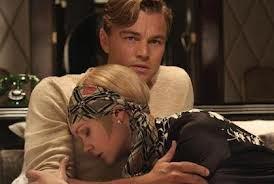
He’s amazing here. I can’t convey how fantastic he is.
Whenever he’s on screen, the film settles in and “works,” and his interactions with Daisy and Nick have a lovely sense of pathetic, forlorn, poignancy. When he’s not onscreen, you realize how much the film needs him to thrive. You really just spend your time wanting him to come back. Luckily, he’s on screen for a great deal of the film’s running time, so that means most of the film is effective and emotional engaging.
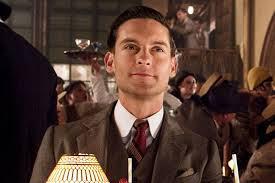
“I’m just gonna sit back and watch Leo go.”
The ultimate question is, of course, “to see or not to see”. I love the novel, so I may not be able to be entirely able to remain unbiased towards the film. I went in wanting to be swept up in the narrative, and was able to become so once the film allows some breathing room. It’s not perfect, and at times it is a misguided, trashy mess. However, at the film’s conclusion, I had to admit the film worked for me, despite several reservations. It’s almost as though the world decided it was simply easier to throw everything into topsy-turvydom. Poles are reversed and it is decided black can be white, up can be down, and sensory assault is not such a brutal crime when there is such a fantastic central performance amidst the onslaught. Every time I wanted to roll my eyes at the excess on display, the lump in my throat DiCaprio refused to keep from dissolving prevented me from doing so. I can’t guarantee everyone will feel this way. In fact, I know some have already found the film to be “too much,” and I’m not certain those who don’t already have some affection towards the source material will enjoy it. I can only tell you how I felt about it, and I walked away glad I had seen it. The film’s hangs it hopes for success on Leonardo DiCaprio’s broad shoulders, and he doesn’t disappoint. How could I not recommend a film with a central performance that complicated and effective? The film may not be my “green light,” but I can’t deny its ability to engage me.
Check out a trailer for the film below:
So, what do you think, guys? Have you seen the film? Are you plannign to see it? Did you like it? Hate it? Let us know in the comments!

